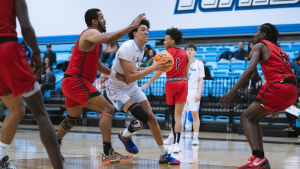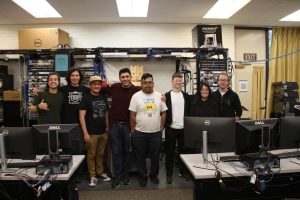Metaverse, the virtual reality world that continues to grow inside and outside the classroom
March 18, 2022
Technology company CEO Mark Zuckerberg announced on Oct. 28, 2021, the rebranding of his social media empire Facebook, now called Meta, along with his plans for the platform to join the Metaverse.
The Metaverse can best be described as the next step in technological communication. It binds the physical world to an online alternative world made up of 3D avatars, virtual reality and other forms of digital communication.
The concept itself is not an entirely new concept in the technological field. Moorpark College Game Design professor Johnathan Bair experienced VR technology in the mid-1980s.
“I got to play with a very old VR setup that didn’t allow movement but would have you wear a headset to look around in VR space and a very old flight stick that would allow me to aim and shoot,” said Bair. “The objective of the game was to shoot metal nuts and bolts at odd-looking spaceships. I didn’t know how advanced that was at the time, but it left an impression”
In the early 2000s, VR chat rooms became an extremely popular way to socialize worldwide. Two of the most popular websites were three-dimensional Avatar chat rooms SecondLife and IMVU.
Players could create and customize an avatar to use as a conduit for exploration and self-expression in user-built worlds with very little regulation. For those who felt unable to express themselves in the physical world, the ungoverned lands of the virtual world could be a risk-free method of exploration.
VR is currently utilized in Bair’s Game Technologies two class. Bair gives his students a design prompt and the complete creative freedom to develop the rest of the game. This semester the class is working on a VR Barista Simulation game.
“At this point in the students’ careers, they have already built several games and have developed art, design, or programming skills that they can then use to make a VR game,” said Bair.
During the pandemic, several examples of virtual socialization and events were introduced, varying from Zoom birthday parties to online game nights with Jackbox Games. In collaboration with Microsoft, the NBA has introduced a way for fans to remotely attend basketball games to support their favorite players through Livestream.
Microsoft founder Bill Gates speculated in his personal blog that workplace meetings will take place in the Metaverse within the next few years. SecondLife now advertises its remote work and event capabilities, along with its marketplace opportunities to create and sell virtual products.
Real estate is also an available venture in the Metaverse. Metaverse Property is the first real estate company to offer virtual estates and land for sale and rent in the Metaverse. Currently, five Metaverses are supported for purchasing real estate through Metaverse Property, including Decentraland, The Sandbox, Somnium Space, Cryptovoxels and Upland.
With ongoing immersion into the Metaverse, education may be the next in line. Currently, 60% of courses offered for the Moorpark College Spring 2022 semester are online as a mixture of asynchronous and synchronous classes. This compares drastically with pre-COVID percentages, with only 30% of students enrolled in online classes. VR may open new opportunities for online education off-campus.
Interim Vice President of Academic Affairs Mary Rees shares her thoughts about the idea of VR being used by the college to help students learn.
“I definitely think it will allow students to safely experience real-life applications,” said Rees. “Often these experiences are too difficult, too expensive, or unsafe to directly have our students engage in. VR fits the bill very well.”
Several different kinds of VR systems are currently used on campus in Bair’s department. The most commonly used in classes is the Microsoft Augmented Reality Headset, an AR and VR headset, along with the Vive and Oculus systems.
However, he believes that many more developments will need to be made in order to provide an effective VR education environment. While programs like Zoom and Discord allow users to share screens, they still lack the ability for fluid and integrated screen communication.
“Until we can use a mouse or cursor to point at someone else’s screen to say, ‘Click this,’ or ‘Move this here and adjust that,’ virtual classrooms will still be inferior to physical space,” explained Bair.
Other factors such as powerful internet connection and the financial costs of providing VR to all students must also be evaluated in order to create a fluid experience comparable to on-campus classes.
“If we could develop a VR system with a gaming console price of entry and no required additional computer that has access to an OS like Windows and services for integration, we could potentially see VR classrooms and the Metaverse sooner than the infrastructure would allow,” said Bair. “But that’s just it, can we convince big business to develop something at cost to change the world?”
As of Feb 14, classes returned to the campus and Moorpark College does not yet have any investment into the metaverse.







